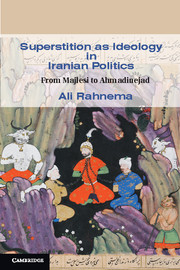Book contents
- Frontmatter
- Contents
- Preface and Acknowledgements
- Introduction
- Part I POLITICIZING OCCULT ISLAM
- 1 Ahmadinejad
- 2 Mohammad-Reza Shah Pahlavi's Supernatural Shiʿism and Its Political Implications
- 3 Shah Esmaʿil Safavi
- Part II POPULAR SHIʿISM
- Conclusion
- Bibliography
- Index
- List of Books in the Series
- References
3 - Shah Esmaʿil Safavi
The Quintessentially Occult Shiʿi King
Published online by Cambridge University Press: 05 June 2012
- Frontmatter
- Contents
- Preface and Acknowledgements
- Introduction
- Part I POLITICIZING OCCULT ISLAM
- 1 Ahmadinejad
- 2 Mohammad-Reza Shah Pahlavi's Supernatural Shiʿism and Its Political Implications
- 3 Shah Esmaʿil Safavi
- Part II POPULAR SHIʿISM
- Conclusion
- Bibliography
- Index
- List of Books in the Series
- References
Summary
THE EXTREMIST LINEAGE OF SHAH ESMAʿIL
From the impressionable age of six, Shah Esmaʿil was steeped and indoctrinated in the exotic and extremist Shiʿism of his father, Sheykh Heydar. Sheykh Heydar was the son of Sheykh Joneyd and the founder of the Heydariyyeh sect. Between the ages of six and nine, Esmaʿil found sanctuary in Lahijan, where Kar Kia Mirza ʿAli, the governor of Lahijan and a renowned devotee of the Heydariyyeh, protected the young Shah-to-be and taught him the esoteric knowledge and secrets of his father's sect.
The Heydariyyeh, an extremist Shiʿi sect believed that a part of God's Divine attributes was incarnated and embodied in Imam ʿAli. They argued that Imam ʿAli had torn down the door of the Khybar fortress because of his possession of Divine powers. The Heydariyyeh believed that this Divine power was transmitted from Imam ʿAli to his descendants, Hoseyn, Zeynolʿabedin, Mohammad-Baqer, Jaʿfar-Saddeq and Musa al-Kazem. After Imam Musa al-Kazem (the Seventh Imam), this hereditary Divine feature is no longer passed on to the direct lineage of Imam ʿAli, but dwells in the founders of the Safavi dynasty, finally residing within Sheykh Heydar, Shah Esmaʿil's father.
The belief in the Divine nature of Esmaʿil's father and grandfather among their zealot followers was so strong and tenacious that even after the death of Joneyd, Esmaʿil's grandfather, his followers continued to claim that since their master and leader was God, he must have been endowed with eternal life.
- Type
- Chapter
- Information
- Superstition as Ideology in Iranian PoliticsFrom Majlesi to Ahmadinejad, pp. 137 - 156Publisher: Cambridge University PressPrint publication year: 2011



